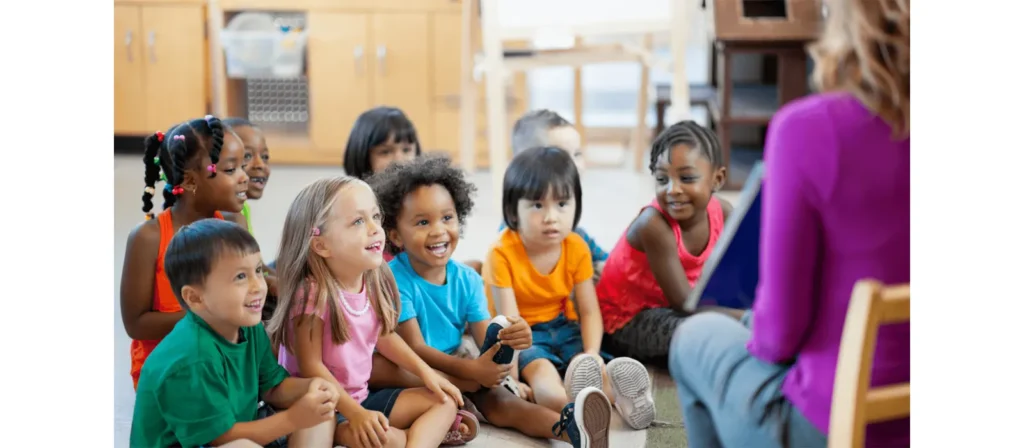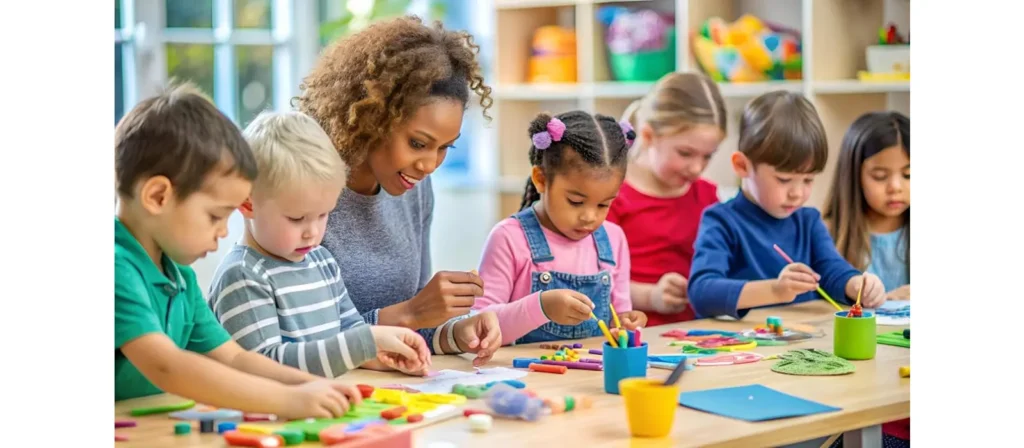Preschool teaching is more than reading stories and singing songs. It is a complex, high-impact profession that requires a wide range of skills to guide young children through one of the most crucial stages of development. Every word spoken, activity planned, and emotion managed in a preschool classroom contributes to a child’s early learning experience. To build a truly inspiring classroom, teachers need more than just passion. They need a solid foundation of skills that allow them to teach, lead, and connect with intention.
The classroom environment a preschool teacher creates can shape a child’s view of learning for years to come. When teachers possess strong communication, management, and observation skills, they are able to support children’s emotional safety, foster curiosity, and introduce structure without stifling creativity. These skills are not just helpful. They are essential to ensuring that young learners thrive academically, socially, and emotionally.
In this article, we break down 15 of the most important preschool teacher skills that help create classrooms where children feel seen, supported, and inspired. From fundamental classroom strategies to professional-level traits that elevate teaching quality, each skill plays a unique role in shaping a classroom that is not only effective but truly enriching.
The impact of preschool teacher skills on early childhood development
Preschool teacher skills shape the earliest stages of a child’s cognitive, emotional, and social growth. From language development to behavior modeling, the way teachers communicate, manage the classroom, and plan lessons plays a foundational role in how children learn and interact with the world around them. Strong skills in these areas help create structured yet nurturing environments where young learners feel safe, supported, and ready to grow.
Even subtle abilities, like observing and documenting student behavior, allow teachers to respond to individual needs, guide development, and catch early signs of challenges. In short, the everyday skills preschool teachers use don’t just manage a classroom, they actively influence how children think, feel, and connect.
Preschool teacher skills can drive career development
Preschool teacher skills do more than shape a child’s learning. They also influence a teacher’s long-term career growth. Educators who demonstrate strong communication, classroom management, and planning skills often stand out as dependable and capable professionals. These core abilities not only improve classroom outcomes but also position teachers for promotions, leadership roles, and expanded responsibilities.
Skills like emotional intelligence, collaboration, and adaptability further support a teacher’s ability to work well with colleagues and take on new challenges. As teachers strengthen their skills over time, they become more confident, reflective, and ready to move into advanced roles within early childhood education.
More recent data from Glassdoor in late 2025 shows that the average salary is approximately $42,901 per year, with most preschool teachers earning between $36,821 and $51,153 annually. In higher-paying states or specialized early education settings, experienced teachers may earn closer to $60,000 or more, especially when working in public school programs or private institutions with extended curricula.
In short, developing key preschool teacher skills does more than benefit students—it also opens doors for ongoing professional advancement.
Essential skills for preschool teachers
Habilidades de comunicação
Communication in preschool involves more than just talking. It includes giving clear instructions, using age-appropriate vocabulary, and listening actively. Teachers must adjust their tone, pace, and language depending on the child’s age and comprehension level.
This skill also includes modeling respectful dialogue, using visual cues to support understanding, and reinforcing classroom expectations through consistent phrasing. Communication with parents requires professionalism, clarity, and regular updates on their child’s day-to-day experiences.
Good communication also includes non-verbal cues, eye contact, tone of voice, and body language all help create a welcoming and supportive atmosphere. When used consistently, strong communication skills contribute to a classroom culture where children feel confident to speak, listen, and engage.

Classroom Management Skills
Classroom management in preschool involves creating a structured environment where young children can learn, play, and interact safely. It requires the teacher to set routines, manage group behaviors, and respond calmly to disruptions without losing control of the overall flow of the day.
A well-managed classroom also includes clear rules that are consistently reinforced. Teachers explain expectations in simple terms and follow through with logical consequences when needed. Instead of relying on reactive discipline, effective classroom managers use preventative strategies, such as offering choices, redirecting energy, or engaging children before problems escalate.
Managing a group of preschoolers also involves physical layout. The way learning centers are arranged can influence noise levels, movement flow, and child independence. Teachers must be alert, flexible, and ready to adjust the environment in real time.
Strong classroom management creates a setting where all children can participate, explore, and engage with minimal chaos. It allows the teacher to remain focused on teaching rather than constantly handling behavioral interruptions.
Behavior Management Skills
Behavior management is one of the most visible and challenging aspects of preschool teacher skills. It requires guiding children’s actions in a way that promotes self-control, cooperation, and respect within a group setting.
Preschool teachers use various techniques to manage behavior without relying on harsh discipline. These include redirection, offering choices, using positive reinforcement, and helping children label and express their emotions. A calm, consistent response to behavioral issues is essential, especially when children are testing limits or struggling to regulate themselves.
Clear rules and routines are part of this skill set, but so is flexibility. Teachers need to recognize the reasons behind a child’s behavior and choose responses that are firm but supportive. Behavior management also involves teaching appropriate social behavior, how to wait, take turns, or solve conflicts with words.
Developing strong behavior management as part of core preschool teacher skills helps maintain a respectful and emotionally safe classroom while supporting each child’s social development.
Child Development Knowledge and Skills
A strong understanding of child development is a central part of effective preschool teacher skills. It allows educators to recognize what is typical for different ages, spot developmental delays, and plan appropriate activities that support learning at each stage.
Teachers apply this knowledge daily, from setting realistic expectations for attention spans to choosing materials that support fine motor growth or language development. Knowing how children develop physically, emotionally, socially, and cognitively helps teachers respond appropriately to a wide range of behaviors and needs.
Preschool teacher skills in this area also include recognizing sensitive periods in development and adapting instruction accordingly. For example, a teacher might adjust group sizes, activity length, or instruction style based on the developmental readiness of the children in their care.
Without a clear grasp of child development, even well-intentioned instruction can miss the mark. This knowledge anchors many other preschool teacher skills in real, age-appropriate practice.

Lesson Planning Skills
Lesson planning is a structured preschool teacher skill that reflects how well a teacher understands both educational goals and the developmental needs of young children. Within the broader set of preschool teacher skills, it is one of the most practical and visible areas of professional expertise.
Effective planning in a preschool setting involves more than organizing activities by the hour. It requires aligning learning objectives with age-appropriate methods that support cognitive, physical, and emotional growth. For instance, activities should be built around play, exploration, and repetition, approaches supported by child development theorists like Jean Piaget. His research emphasized that children in the preoperational stage learn best through hands-on experiences and active engagement.
Lev Vygotsky’s concept of the Zone of Proximal Development (ZPD) is also useful in this context. Preschool teachers who understand this framework plan lessons that stretch a child’s abilities just beyond their current level, while still offering enough support for success. This is where careful observation, group structuring, and differentiated instruction become essential components of lesson planning.
Strong lesson planning is not just a sign of preparedness. It reflects a teacher’s ability to translate theory into practice in ways that support real learning for every child in the room.
Observation and Record Keeping Skills
Observation is a foundational part of preschool teacher skills. It involves watching children closely during play, routines, and structured activities to understand their learning styles, emotional responses, and developmental progress. These insights help guide daily decisions about how to support each child effectively.
Record keeping turns these observations into useful data. Teachers document what they see using notes, checklists, and developmental charts. These records track patterns over time and serve as a basis for planning, parent communication, and identifying any concerns that may require further support or referrals.
Accurate and consistent documentation allows teachers to make informed choices about classroom strategies. It also strengthens communication with families, ensuring they are part of their child’s early learning journey.
Organizational Skills
Organizational skills help preschool teachers manage the many moving parts of a busy classroom. This includes setting up learning spaces, maintaining materials, managing time, and keeping accurate records. A well-organized environment supports both the teacher’s efficiency and the children’s ability to engage independently.
In the preschool setting, organization shows up in routines, labeled bins, structured schedules, and clearly defined learning areas. These systems help children know what to expect and where to find things, which supports their sense of order and security. For teachers, staying organized reduces stress and creates more room for responsive, intentional teaching.
Among preschool teacher skills, organization is often what keeps the day running smoothly. It allows teachers to focus on interactions and learning moments rather than constantly managing chaos.

First Aid and Safety Skills
First aid and safety are non-negotiable components of preschool teacher skills. Teachers must be prepared to respond quickly and appropriately to accidents, minor injuries, allergic reactions, or other unexpected incidents that may occur in a classroom filled with active young children.
This skill includes more than basic first aid procedures. It involves maintaining a safe classroom layout, conducting regular safety checks, knowing emergency protocols, and supervising with constant attention. Teachers must also be familiar with health policies and know how to manage contagious illnesses or communicate health concerns to families.
Being confident and well-trained in safety procedures helps prevent small issues from becoming major ones. It also reassures parents that their children are in capable, protective hands.
Emotional Intelligence
Emotional intelligence is the ability to recognize, understand, and respond to emotions—both in oneself and others. Among preschool teacher skills, it plays a vital role in building relationships with young children, many of whom are still learning how to express and regulate their feelings.
Teachers with strong emotional intelligence notice subtle cues like frustration, fear, or excitement. They respond with calm, patience, and empathy. This helps children feel safe, seen, and supported, especially during moments of stress or transition.
Emotional awareness also helps teachers manage their own responses. Staying composed in challenging situations supports better decision-making and keeps the classroom emotionally balanced, even when the day is unpredictable.
Other skills to improve education level
While essential preschool teacher skills form the core of effective teaching, there are other advanced or supporting skills that can significantly raise the standard of education delivered in the classroom. These abilities improve classroom climate, enhance engagement, and support more personalized learning. They also help teachers work more collaboratively and respond better to the diverse needs of young learners.
These skills are often what distinguish a competent teacher from a truly inspiring one. When integrated with foundational teaching practices, they allow educators to deliver more thoughtful, creative, and responsive instruction. The following skills play a major role in building well-rounded, future-ready teaching professionals.
Creativity
Creativity is one of the most versatile preschool teacher skills, supporting everything from lesson design to conflict resolution. Creative teachers use stories, music, sensory activities, and visual arts not just as entertainment but as tools for deeper learning. This helps children engage with content in ways that align with their natural curiosity and developmental stage.
In addition to lesson planning, creativity helps teachers respond effectively in real time when activities do not go as planned. For example, if outdoor time is canceled due to weather, a creative teacher might turn the classroom into a pretend campsite or set up movement games indoors. This flexibility maintains momentum in the classroom and also models problem-solving and imaginative thinking for children.

Adaptability
Adaptability allows preschool teachers to remain steady in unpredictable environments. No two days are alike in a preschool classroom. Behavior shifts, routines are interrupted, and individual needs often emerge without warning. Adaptable teachers adjust without letting those changes disrupt the overall learning experience or classroom stability.
This skill supports other preschool teacher skills by giving educators the confidence to modify lesson plans, try alternative strategies, or manage transitions more smoothly. For example, if a group activity is not working for certain children, an adaptable teacher might split the group or change the format while maintaining the learning objective. In a field where flexibility is a daily requirement, adaptability is essential for sustaining quality education.
Positive Guidance Skills
Positive guidance is a proactive approach to behavior that emphasizes teaching over punishment. It is based on the belief that young children need help understanding expectations and regulating emotions rather than being reprimanded for mistakes. Among advanced preschool teacher skills, positive guidance fosters respectful, emotionally safe environments that support long-term social development.
Teachers skilled in positive guidance use redirection, visual supports, and consistent language to shape behavior. They remain calm during emotional outbursts and treat misbehavior as a learning opportunity. Over time, this method helps children internalize expectations and become more capable of resolving conflicts independently. It also strengthens the teacher-child relationship and reduces power struggles.
Collaboration and Teamwork
Preschool teaching is rarely a solo role. Teachers must collaborate daily with assistants, co-teachers, specialists, and school administrators to ensure a consistent and effective learning environment. Strong collaboration requires clear communication, shared goals, and a willingness to support and be supported by others.
This skill also reinforces other preschool teacher skills. For instance, when a lead teacher and an assistant work seamlessly during transitions or behavior management, the classroom runs more smoothly. Collaboration creates a professional culture where knowledge and strategies are exchanged, improving outcomes for both teachers and students. It also sets a positive example for children, showing them how cooperation works in real-world settings.

Parent Engagement Skills
Engaging with parents is a critical part of improving early education outcomes. Teachers who develop strong parent engagement skills build trust and encourage open communication. This creates a bridge between home and school that supports consistency in behavior expectations, emotional support, and learning goals.
Preschool teacher skills in this area include the ability to conduct regular check-ins, share updates in accessible language, and involve parents in decision-making when appropriate. Teachers may also offer suggestions for at-home activities or strategies that extend learning beyond the classroom. When parents feel seen and included, they are more likely to reinforce the values and skills taught in school, creating a more unified developmental experience for the child.
Commitment to Lifelong Learning
Lifelong learning reflects a teacher’s dedication to staying current and effective in an ever-evolving field. This includes attending professional development workshops, keeping up with early childhood research, and reflecting on one’s teaching practices. Among preschool teacher skills, this one ensures continuous growth in both knowledge and application.
Teachers committed to lifelong learning are often more confident and creative in their work. They seek feedback, try new approaches, and remain open to change. This mindset encourages accountability and professional integrity, positioning teachers not just as caregivers but as educational leaders in their classrooms and beyond.
Envie-nos uma mensagem se tiver alguma dúvida ou solicitar um orçamento. Nossos especialistas responderão em até 48 horas e ajudarão você a selecionar o produto ideal.
Conclusão
Preschool teacher skills are the foundation of a successful, engaging, and emotionally safe early learning environment. They go far beyond basic caregiving. These skills involve communication, planning, behavior support, and emotional awareness, all carefully applied to meet the needs of young learners. A well-prepared teacher understands how to manage a group, respond to individual needs, and shape learning experiences that are developmentally appropriate and meaningful.
The most effective preschool educators are those who commit to growing their skills continuously. Whether it is mastering essential classroom practices or building advanced abilities like creativity, adaptability, and collaboration, these efforts have a direct impact on children’s growth. At the same time, these skills strengthen a teacher’s own career, opening the door to leadership, specialization, and long-term professional fulfillment.
In a field where every moment counts and every interaction matters, preschool teacher skills are not just helpful tools. They are what make the difference between managing a classroom and truly inspiring one.




